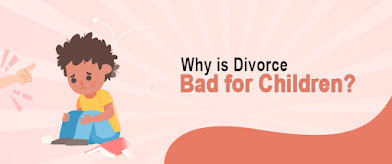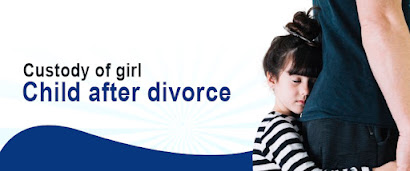Why is Divorce Bad for Children?
Divorce is a tumultuous event that can have lasting repercussions, especially for the most vulnerable parties involved: the children. In India, navigating child custody after divorce in India adds another layer of complexity to an already emotionally charged situation. Let's delve into why divorce can be particularly detrimental to children's well-being and explore the challenges surrounding child custody in India.
Impact on Children's Emotional Well-being:
One of the most significant impacts of divorce on children is the emotional turmoil it induces. Children often experience feelings of confusion, sadness, and anger as their once-stable family unit undergoes a seismic shift. Witnessing parental conflict and experiencing the dissolution of their family can leave lasting scars on children's psyches, affecting their self-esteem and emotional resilience.
Additionally, the
disruption of routines and the loss of familiar surroundings can further
exacerbate children's distress, making it challenging for them to cope with the
aftermath of divorce.
Child Custody Battles in India
In India, determining child custody after-divorce in India can be a contentious and protracted process. The legal system often
grapples with striking a balance between the rights of both parents while
prioritising the best interests of the child. Custody battles can escalate into
bitter disputes, with each parent vying for primary custody or visitation
rights.
This adversarial
approach can take a toll on children, subjecting them to additional stress and
instability as they become pawns in their parents' conflicts. Moreover, the
prolonged legal proceedings can prolong children's exposure to the emotional
fallout of divorce, further compounding their distress.
Financial Strain and Instability
Divorce often brings about financial strain and instability,
which can have far-reaching consequences for children. The division of assets
and financial resources can lead to a decrease in the standard of living for
both parents and children alike.
Economic hardships
may result in children being deprived of essential resources and opportunities,
such as access to quality education, healthcare, and extracurricular
activities. This financial strain can exacerbate feelings of insecurity and
anxiety in children, impacting their overall well-being and prospects.
Disrupted Parent-Child Relationships
Another detrimental aspect of divorce for children is
the disruption of parent-child relationships. In the aftermath of divorce,
children may experience a diminished sense of closeness and connection with one
or both parents, particularly if one parent is awarded primary custody.
Also Read This - Navigating Financial Turbulence
The logistical challenges of shared custody
arrangements or limited visitation can further strain parent-child bonds,
leaving children feeling alienated or neglected. Moreover, parental conflict
and animosity can poison the parent-child relationship, undermining
trust and communication between parents and children.
Psychological and Behavioral Challenges
Divorce can also manifest in psychological and
behavioural challenges for children. Studies have shown that children of
divorced parents are more likely to experience mental health issues such as
depression, anxiety, and conduct disorders compared to their counterparts from
intact families.
Additionally, divorce can increase the risk of academic difficulties, substance abuse, and delinquent behaviour among children. These challenges can have long-term implications for children's development and future well-being, underscoring the importance of providing adequate support and resources to mitigate the negative effects of divorce.
Divorce can have profound and multifaceted impacts on children, with repercussions that extend far beyond the dissolution of their parents' marriage. In India, navigating child custody after divorce in India adds another layer of complexity to an already challenging situation. From emotional upheaval and financial strain to disrupted parent-child relationships and psychological challenges, the effects of divorce on children are wide-ranging and long-lasting.
Also Read This - How a Father Can Ensure Child Custody in India?
Legal Raahi suggests that as parents and society at
large, it is imperative to prioritize the well-being of children during and
after divorce, ensuring that they receive the support and care they need to
navigate this tumultuous period in their lives. By fostering a supportive and
nurturing environment, we can help mitigate the negative effects of divorce and
promote positive outcomes for children in the long run.




Comments
Post a Comment